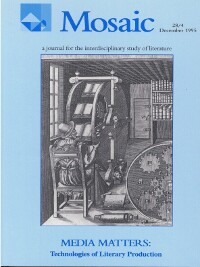Issue 28.4
Overview

Special Issue: Media Matters: Technologies of Literary Production
Published: December 1995
View the issue introduction or see the issue summary and contents below.
9 essays, totalling 196 pages
$15.00 CAD
“To the extent that media constitute the operating system for both the private and social body, there is a sense that we have yet to achieve the appropriate level [of discourse and analysis] to discuss the totalizing effects of media,” write Joseph Donatelli and Geoffrey Winthrop-Young in their introduction to this special issue of Mosaic. This issue seeks to review, formulate, and explore people’s ideas, uses, and representations of media from medieval to modern times. Offering a retrospective introduction and a critical bibliography of media studies that remains relevant, this issue presents essays on media implications of Chaucer’s prints, Dante and the Codex Altona, television and the theatre, hypertext, Margaret Atwood and gender, and postmodernism and the rise of electronic literature.
Chaucer from Manuscript to Print: The Social Text and the Critical TextA.S.G. Edwards As Chaucer’s works move from manuscript to print we see the ways in which his own oeuvre is reconstituted. This essay examines some of the implications of media change involved in this movement, both in relation to particular texts, the canon in general and the related editorial issues. | |
Interpreting Codicology: Re-visions of the Divine Comedy in the Codex AltonaMichelle R. Wright Focusing on the intentional and accidental features of medieval manuscripts, this essay explores how the Codex Altona draws attention to the page as a medium of representation and to the interpretive role of illustrations. The reader’s moral progress is shown to depend on hermeneutic skill in a context that relates artistic achievement to pride and avarice. | |
A Funny Thing Happened on the Way to the Theater: Negotiating Meaning and Technology in PerformanceR. John Rice and Paul M. Malone Building on a historical perspective of theater as a written and performed medium, the authors examine the directions that theater might take with the development of “virtual reality” technologies. Documenting the potentials and shortcomings of V. R. within theatricality, their concern is with those conventions governing the negotiation of meaning(s) in performance. | |
Traveling in the Breakdown Lane: A Principle of Resistance for HypertextStuart Moulthrop The recent advent of hypertext, or electronic “non-sequential writing,” poses significant challenges for literary artists and critics. There is something seductive and inviting about this medium, but also something that inspires resistance. This essay looks beyond reactionary responses to evaluate the ethic of resistance inherent in hypertext itself. | |
Artif[r]acture: Virulent Pictures, Graphic Narrative and the Ideology of the VisualWilliam Anthony Nericcio Arguing that the mestizo dynamics of comic books (one part line art, one part cinema, one part prose fiction) demand critical scrutiny, this essay examines provocative examples from the world of “graphic narratives,” with particular focus on the work of Gilbert and Jaime Hernandez. An overall concern is the political and pedagogical implications of the current shift from word-driven to image-centered discourse. | |
Coming Attractions: Theater and the Performance of TelevisionElizabeth Klaver Coming Attractions explores a world of images, commodities and consumer desire by following the rise of a serial killer to celebrity status. This essay argues that, by enacting and contesting televisual discourse, the play is able to reconsider the place of theater in a media culture and the effect of media on notions of selfhood. | |
Orality and Literacy as Gender-supporting Structures in Margaret Atwood’s The Handmaid’s TaleMario Klarer Focusing on The Handmaid’s Tale, this essay explores the way that concepts of orality and literacy are gender-coded, and the way that aspects of orality can be politically cultivated to prevent the destabilizing potential of written discourse. | |
The Technology of Quotation: William Gaddis’s JR and Contemporary MediaJoseph Tabbi The convergence of technology and postmodern theory provides an opportunity to reconsider the distinctive esthetic of William Gaddis. His work opens a new representational space that of the media of corporate connection and reproduction through the figuration of advanced technology and contemporary “materialities of communication.” | |
Literature and Media Change: A Selective Multidisciplinary BibliographyJoseph Donatelli and Geoffrey Winthrop-Young A critical bibliography providing an overview of media studies scholarship in 1995. |